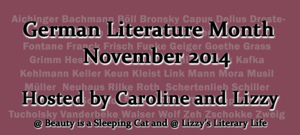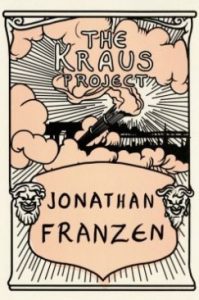This review is part of the German Literature Month, hosted by Lizzie (Lizzies Literary Life) and Caroline (Beauty is a Sleeping Cat)
The Kraus Project by Jonathan Franzen is a hybrid book.
It contains on the upper part of each page on the left side the original German text of four essays and a poem by the Austrian author Karl Kraus, mirrored by the English translation of the respective text on the opposite right page.
On the lower part of each page are numerous footnotes that are sometimes longer than Kraus’ text itself. The footnotes are partly by Jonathan Franzen, partly by the Kraus scholar Paul Reitter, partly by the German-Austrian novelist Daniel Kehlmann, like Franzen an admirer of Kraus. Franzen is also the translator of Kraus’ texts.
Since Karl Kraus is almost unknown in the English-speaking world, the publisher obviously thought it a good idea to bring this book on the market with Jonathan Franzen as author on the title page. But again, this book is a translated and annotated collection of some of Kraus’ texts.
A few words about Karl Kraus:
coming from a wealthy assimilated Jewish family, Kraus grew up in Vienna at the end of the 19th century. Vienna was at that time a melting pot of people and ideas. Literature and theater (two lifelong passions of Kraus) were at its height, Sigmund Freud developed psychoanalysis that revolutionized later many aspects of our lives, Mahler and Schönberg revolutionized music, Adolf Loos, Kraus closest friend revolutionized architecture, the Vienna school of economists revolutionized economics, the Vienna Circle and Ludwig Wittgenstein revolutionized philosophy. All kind of modern ideologies came to light in that period in Vienna, including the “modern” racial Antisemitism and its natural reaction, Zionism, whose main propagandist was the journalist Theodor Herzl, a former colleague of Kraus who would become one of his most hated targets.
“Vienna’s streets are paved with culture; the streets of other capitals are paved with asphalt”,
is a popular aphorism by Kraus.
In this hotbed of culture and ideologies the typical Kaffeehauskultur developed where each faction of intellectuals had their favorite coffeehouses where they met and engaged in group and cartel building, gossiping, writing and reading. Kraus was part of this culture, but never belonged to any group. One of his most remarkable features is that he successfully obtained his absolute independence during all his intellectual life.
Kraus’ main “work” are the roughly 40,000 pages of his journal Die Fackel (The Torch), which he published between 1899 and 1936. In the first years, he admitted every now and then guest authors but from 1912 on, he wrote the journal exclusively by himself.
Die Fackel had a blog-like feel: Kraus’ was publishing whenever he had something to say and about whatever he felt he needed something to say. Although literature and theater were always prominent topics in Die Fackel, Kraus was an avid reader of the Austrian and foreign press – and from here he took most of his inspirations.
Kraus was writing about foreign and local policy, about the situation of workers in the factories, about women’s rights, he was an early advocate of equal rights of homosexuals, and he was an everyday observer of the journalism in Austria, which was in an extremely bad shape according to Kraus.
This opposition to the frequently badly written journalism made Kraus many enemies, especially since he combined it with irony and sarcasm, but also with undeniable truths. His lawyer was for sure a very busy man and it is said that Kraus won almost all his court cases. He knew the rules and acted within these rules very efficiently to expose corruption, nepotism, stupidity and wrong use of language.
He did all this in a unique style, frequently playing with words and creating a richness of aphorisms that may be rivaled only by Lichtenberg. He was also a stage persona: he gave more than 700 performances reading, singing, acting alone on a stage – his audience consisted mainly of addicted Kraus fans; Elias Canetti for example said in his autobiography that he visited more than 300 of Kraus’ unique performances. Kraus must have been a magnetic personality that had many people under his spell.
The two main pieces in The Kraus Project are Kraus’ most famous essays on the German-Jewish poet Heinrich Heine and on the Austrian playwright Johann Nestroy.
Heine is for Kraus on the one hand a great and extremely popular poet. Many of his poems were turned into popular songs and are part of the folk poetry. But Heine’s followers turn his spirit into something superficial. And this is not by accident, it is because of specific virtues in Heine’s works. In Kraus’ times there was a firm belief of many intellectuals that there was a deep difference between Romance and German culture. As Kraus put it:
“Two strains of intellectual vulgarity: defenselessness against content and defenselessness against form. The one experiences only the material side of art. It is of German origin. The other experiences even the rawest of materials artistically. It is of Romance origin. To the one, art is an instrument; to the other, life is an ornament. In which hell would the artist prefer to fry? He’d surely still rather live among the Germans. For although they’ve strapped art into the Procrustean Folding Bed of their commerce, they’ve also made life sober, and this is a blessing: fantasy thrives, and every man can put his own light in the barren window frames. Just spare me the pretty ribbons!…”
Austria, although linguistically part of German culture, is for Kraus deeply affected by the “French” poet Heine. Even the biggest Anti-semites “forgave” Heine his Jewish origin, just because his verses appeal so much to the tendency of most of the Vienna literati to gloss over everything with patches of jokes and irony. (I owe The Kraus Project the information that young Adolf Hitler in his Vienna years supported an initiative to build a monument for Heine – Heine’s poems were later not removed from the school books in Nazi Germany, just his name; it was all supposed to be “folk poetry” then).
While the Heine essay is very acerbic in it’s evaluation of the poems of this great German writer, the big hater Kraus shows in the other main essay that he can be also a great admirer and lover: he re-discovers the Austrian actor, singer, playwright Johann Nestroy, a popular performer of the first part of the 19th century who fell into oblivion soon after his death.
That Nestroy is nowadays considered to be one of the greatest authors for theater in German is almost exclusively a result of the decades of Kraus’ efforts to make him again popular. I love Nestroy’s plays, and there is hardly anything (with the exception of Shakespeare, and the obscure play Datterich by Ernst Elias Niebergall, written in Darmstadt dialect) that I enjoy more on a stage than his plays. To me, the Nestroy essay is Kraus’s best essay – the Heine piece, although very interesting, shows also a side of Kraus that is not very appealing: the text is not free from Anti-semitic slurs.
Franzen’s translation is a heroic and brave effort and mostly very decent in my opinion. Kraus is extremely difficult to translate and that he tackled this task deserves a lot of respect.
The footnotes are frequently related directly to the text. Paul Reitter adds a lot of his knowledge about Kraus, much to the profit of the reader. Also many of Franzen’s and Kehlmann’s footnotes are interesting. The one thing that surprised me was that Franzen is dragging the reader a lot into his personal life during the time he lived in Germany and Austria as a student. We learn many details about the person Jonathan Franzen, including the story of his failed first marriage, and a short bout of mental illness when he was in Germany. If you like Jonathan Franzen as an author (I do), you might as well enjoy this part of the annotations, but if not you will have to skip some of them. I am still wondering if it wouldn’t have been better to split the book in two: a translation of Kraus only, and a longer essay with Franzen’s view of Kraus.
Kraus was a larger-than-life author. His play Die letzten Tage der Menschheit (The Last Days of Mankind) is about 800 pages long. The Kraus Project gives some insight in part of his work, but those who would like to discover the full Kraus and also the Vienna of his times (because most of his work can be only understood from the context) should maybe read in parallel also Carl Schorske’s excellent book Fin-de-siècle Vienna: Politics and Culture.
Let me close with a poem by Karl Kraus in which he explains why he kept silent for a long time after the Nazis took power in Germany:
Let no one ask what I’ve been doing since I spoke.
I have nothing to say
and won’t say why.
And there’s stillness since the earth broke.
No word was right;
a man speaks only from his sleep at night.
And dreams of a sun that joked.
It passes; and later
it didn’t matter.
The Word went under when that world awoke,Man frage nicht, was all die Zeit ich machte.
Ich bleibe stumm;
und sage nicht, warum.
Und Stille gibt es, da die Erde krachte.
Kein Wort, das traf;
man spricht nur aus dem Schlaf.
Und träumt von einer Sonne, welche lachte.
Es geht vorbei;
nachher war’s einerlei.
Das Wort entschlief, als jene Welt erwachte.
Jonathan Franzen: The Kraus Project, Fourth Estate, London 2013
Carl Emil Schorske: Fin-de-siècle Vienna: Politics and Culture, Vintage 1980
© Thomas Hübner and mytwostotinki.com, 2014. Unauthorized use and/or duplication of this material without expressed and written permission from this blog’s author and/or owner is strictly prohibited. Excerpts and links may be used, provided that full and clear credit is given to Thomas Hübner and mytwostotinki.com with appropriate and specific direction to the original content.





 Facebook
Facebook RSS
RSS Twitter
Twitter